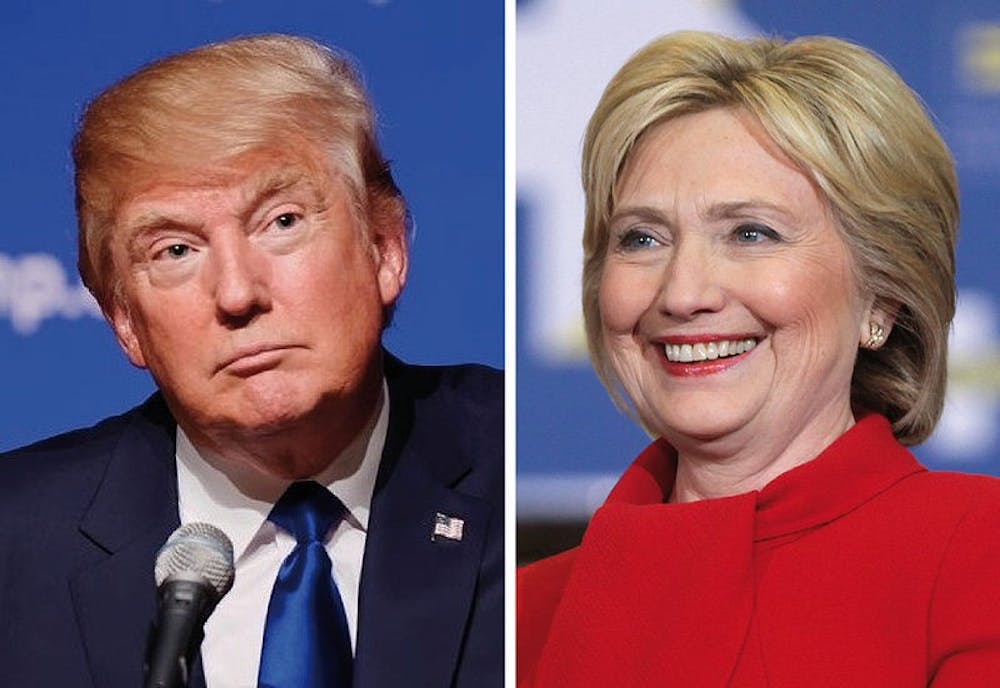The University Center for Politics recently partnered with the National Institute for Civil Discourse to promote national standards of civility for the 2016 presidential debates — and some feel these standards are not being followed.
Jane Calderwood, director of congressional programs for the National Institute for Civil Discourse, said these standards were sent out to the campaigns, moderators and the Commission on Presidential Debates, asking them to “adhere to these standards during the debate in hopes that they would spend more time talking about their policies and their plans for the future of America instead of name calling.”
Standards include expectations that candidates be respectful of others in speech and behavior and make ideas and feelings known without disrespecting others.
Ken Stroupe, associate director of the Center for Politics, said there is room for improvement from Monday night’s presidential debate between Republican candidate Donald Trump and Democratic candidate Hillary Clinton.
“There could have been fewer insults on the part of both candidates, but often they are responding to questions that have been posed to them by the moderator, [and] those questions aren't always issue-based,” Stroupe said. “It wasn't as bad as it could have been, and it wasn't as good as it could have been either.”
Unbecoming behavior at debates interferes with the goal of informing the general public, Stroupe said.
“When you have a campaign that’s riddled with one insult after another and who can top the last insult with something more insulting, it leaves voters with a considerable amount of confusion,” Stroupe said. “It might be entertaining to watch, but it isn't necessarily informative of how he or she will act as president.”
Erich Reimer, the Albemarle County co-chair for the Trump campaign and a third-year Law student, said he believes such tactics are “inevitable and even sometimes enjoyable.”
“I thought it was as entertaining as people thought it would be. I also think that many important and relevant issues regarding the economy, foreign policy and otherwise weren't legitimately discussed,” Reimer said in an email statement. “I'd say Trump won, largely because he was able to show a composed enough demeanor and talk about certain issues with poise throughout much of the debate and thus counteract many people's perceptions beforehand of him.”
Adam Kimelman, vice chair of campaigns for the College Republicans and a second-year College student, said he felt the majority of the debate was spent on a discussion of the candidates rather than the issues at hand.
“I think that as a debate it was pretty poor quality,” Kimelman said, noting he was speaking for himself and not his organization. “There were definitely questions that [Trump] should have been prepared for that he just didn't have good answers to. And I think at the end of the day, it was probably about even or a slight Hillary win.”
Amy Laufer, who served as a national delegate for Clinton at the Democratic National Convention, said Trump did not act with civility during the debate.
“I think the bar is pretty low in terms of respect for each other in this election because of Trump,” Laufer said. “Honestly, I think there's probably always a little bit of disrespect just because [Clinton and Trump] are both trying to get their point of view across. But I think it's more so this year and the fact that he interrupted so often, he was basically heckling some of her responses.”
Speakers are not the only ones, however, the National Institute for Civil Discourse is encouraging to meet civility standards. The institute also has debate standards for moderators.
NBC Nightly News anchor Lester Holt was Monday’s debate moderator; Calderwood said she was unsatisfied with his performance.
“One of the things that we found in this debate is that Lester, the moderator, showed us [a] lack of willingness to condemn uncivil statements made by the candidates during this debate and that was very troubling,” Calderwood said.
University Democrats President Sam Tobin, a fourth-year College student, agreed Holt did not “stand up for procedure” and criticized what he thought was Trump’s lack of civility.
“I think [standards of conduct] were abided by one speaker,” Tobin said. “I think Hillary was pretty civil but brought up issues, tried to keep the conversation on policy, and Donald Trump … was a maniac who did not respect codes of conduct, did not even try to bring up policy and kept on interrupting and interjecting whenever Hillary tried to speak, which I thought was quite rude and quite inconsiderate.”
A release from the Center for Politics reported two out of three voters think the 2016 presidential election has been less civil than previous campaigns.
Stroupe said part of the reason for the increased nasty nature of politics can be assigned to the country’s ideological split.
“We are fairly evenly divided between Democrats and Republicans, so there is this hyper-partisan mood that is dominant all across the country, and people are pushed to the extremes through this enormous number of media outlets that we have today,” Stroupe said.
Calderwood agreed that the media — specifically social media — has a huge influence on current elections and debates.
“With the invention of cable television and … Twitter and other social media, I think that leads to some instability because whatever a candidate says, during the moment they say it is spread across the internet and all over Twitter, and ... in the heat of the moment [people] retweet it or say something mean back,” Calderwood said. “I think in general, it's easier to get press attention and get your name in the papers if you say something mean and nasty. And I think that’s part of the problem.”
There will be two more presidential debates — one Oct. 9 at Washington University in St. Louis and one at the University of Nevada Oct. 19. A vice presidential debate is scheduled for Oct. 4 at Longwood University in Farmville, Va.







